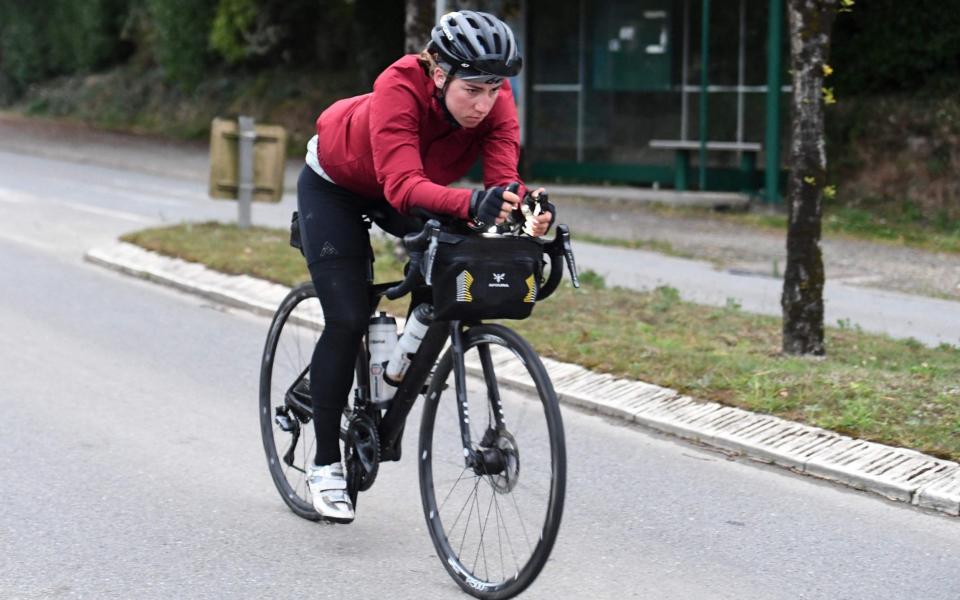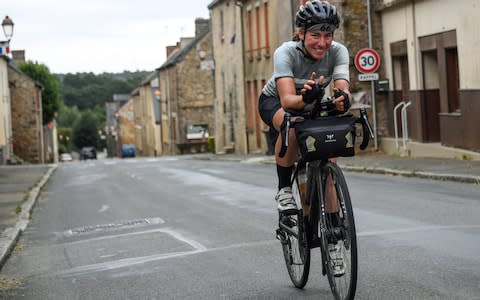Transcontinental Race's first female winner, Fiona Kolbinger, on being a trailblazer, sleeping on streets and fuelling body during 4,000km event

It's the key question for ultra-cyclists. Does Fiona Kolbinger's stunning victory over a field of more than 200 men and 39 women in one of the world's toughest challenges, the Transcontinental Race, mean we can expect more female cyclists women to outlast their male counterparts in similar events?
Kolbinger, a 24-year-old newly qualified doctor from Germany, is aware of the significance of her trailblazing success. "Being a woman is just one point of who I am, but if there's anything I can do for gender equality, I will. It’s a great sign out to the world that really you should never underestimate anyone."
She completed the astonishing 4,000km race from Burgas, Bulgaria to Brest, France in just over ten days, riding on average an eye-watering 250 miles every day, and was 150 miles in front of second-placed Ben Davies. Her victory confirms the widely-held belief that women excel at endurance, and that they are able to compete on an equal footing with men.
Emily Chappell, the fastest woman to finish the race in 2016, says: "It was only a matter of time before a woman won the Transcontinental. I’m hoping she’ll be part of a brave new generation of female-ultra racers, so that in time it’ll be completely normal to see men and women tussling for the top spot."
Kolbinger's win represents enormous progress not just for ultra-distance cycling, but for the Transcontinental, with its entreaty to competitors to ‘ride in the spirit of self-reliance and equal opportunity’. The inaugural race in 2013 had just one female competitor, Juliana Buhring, who had recently set the world record for fastest woman to cycle around the globe solo.

Buhring says: "When I first started racing there were no women out there. It’s been so exciting for me to watch equality becoming more obvious. I think it’s going to explode and it’s fantastic. Fiona’s one more woman pushing that progress forward, and I love the spirit she rode in. It wasn’t so much about the competition as enjoying the ride.’
Ultra-distance cyclists are entirely self-supported. They must carry everything with them on their bikes. Planning and booking hotels in advance of the race is prohibited, as is accepting outside help and support. Most riders get the majority of their rest in sleeping bags on the roadside. Over the ten days, Kolbinger spent just two nights in a hotel.
Food and drink is sourced from wherever riders can get it, mainly petrol stations and supermarkets, and eaten on the go. Every stop costs precious time.
And yet Kolbinger made her race look like the party of a lifetime. Official photography showed her consistently smiling from ear to ear, a stark contrast to the anguished faces of most of her competitors.

She says: "It was very exciting for me. I have never been to any of the places I went through before and I wanted to know what was around every corner. Riding through the Alps, I had so much fun experiencing all the views. It was magnificent."
Travelling light, she took just one set of kit which she washed on the road, a toothbrush and some shower gel, a basic first-aid kit, a sleeping bag, and a few spares and tools for her bike.
The only other item, her essential, was chamois cream. Spending 19 hours a day in the saddle in the same kit gets painful but Kolbinger says blithely she’s had worse saddle sores in the past. "I tested eight pairs of shorts," she confides, settling for a pair that were seam-free "so nothing rubs." She adds: "You have to find out what works best for you. We are all different down there!"
Lee Craigie, former British mountain biking champion and Team GB member, praised Kolbinger’s ‘measured, considered, sustainable self-assured marathon of effort’. Not stopping for too long is as important a race strategy as speed or power. Kolbinger’s Strava and official race data show an astonishingly short stationary time. She avoided the common mistake of too much ‘faffing’.
Fuelling 10 days on a bike is no mean feat. But she kept her intake "as normal as possible. I had sandwiches, bananas – you always end up eating a lot of chocolate and candy of course for pure calories. You eat a lot of crap on such a journey.’"
To win TCR at the first attempt is extraordinary regardless of gender, but those who had seen Kolbinger on a bike may have been less surprised. Her interest in long-distance racing was piqued in 2017 when she took part in London-Edinburgh-London, a 1,400km non-competitive event riders have just five days to complete. A fellow entrant, impressed by her strength on the bike, mentioned TCR to her and the rest is history.
Kolbinger says: "I l filled out the entry form last year but didn’t submit it I the end." In her last year of medical school with just 30 days leave, she didn’t feel able to commit to the punishing training schedule required, although she concedes: "Maybe I was a bit scared of everything and not quite convinced of my ability."
There can be no doubting her ability now. A return to TCR seems on the cards already. "When I rolled into the finish, I thought, when can I start the next one? So I guess I will be back next year."

